七年级英语下册 Module1 Unit4 How is food made教案 上海牛津版
- 格式:doc
- 大小:100.00 KB
- 文档页数:8
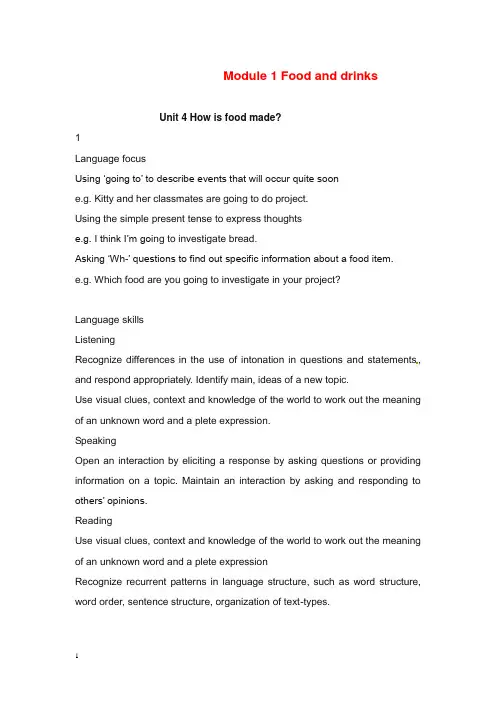
Module 1 Food and drinksUnit 4 How is food made?1Language focusUsing ‘going to’ to describe events that will occur quite soone.g. Kitty and her classmates are going to do project.Using the simple present tense to express thoughtse.g. I think I’m goi ng to investigate bread.Asking ‘Wh-’ questions to find out specific information about a food item.e.g. Which food are you going to investigate in your project?Language skillsListeningRecognize differences in the use of intonation in questions and statements, and respond appropriately. Identify main, ideas of a new topic.Use visual clues, context and knowledge of the world to work out the meaning of an unknown word and a plete expression.SpeakingOpen an interaction by eliciting a response by asking questions or providing information on a topic. Maintain an interaction by asking and responding to others’ opinions.ReadingUse visual clues, context and knowledge of the world to work out the meaning of an unknown word and a plete expressionRecognize recurrent patterns in language structure, such as word structure, word order, sentence structure, organization of text-types.MaterialsStudent’s Book 7B page 20Cassette 7B and a cassette playerPreparationCue the cassette.Pre-task preparationLanguage learning activity(This section aims at providing students with opportunities to practise the language/vocabulary needed or bee familiar with the background for the task that follows.1. Ask students if they know where the food sold at supermarkets is made. Some students may give the correct answer ‘factories’. Ask students whether they have ever visited certain food factories and whether they know how food is produced in factories. Conduct a survey to find out the types of food factories students have visited. List the types of food factories students have visited. List the type of food on the board.2. Ask any students who have visited food factories to talk about their visited. If most of the students have never visited a food factory, a class trip to a factory could be arranged to give them background knowledge in food production. Encourage students to talk about what food production they would like to know more about3. Tell student they are going to do a project on investigating how a certain kind of food is made. Explain to students the meaning of the world ‘investigate’. Ask individuals the subject of their investigation, like this Which food are you going to investigate in your project? to elicit I am going to investigate (name of food). /My project is going to be about (name of food).4. Play the recording Read. Students listen and follow in their books.5. Ask students to say what food the children in Read have chosen to study.6. Review the food vocabulary in Look, ask and answer. Ask students to suggest some more food items they would like to investigate.7. Students work in pairs to ask and answer questions about a food project in Look, ask and answer using the target language.2Language focusUsing connectives to show a resulte.g. I’m inve stigating how food is put cans, so I need to talk to someone at a canning factory.Usin g ‘going to’ to describe events that will occur quite soon.e.g. My project’s going to be about orange juice.Asking ‘Wh-’ questions to find out specific information ab out a thing and a person.e.g. What’s your project going to be about?/ Who do you need to interview for your project?Language skillsListeningRecognize differences in the use of intonation in questions and statements, and respond appropriately. Understand the connection between ideas by recognizing linking words and phrases.SpeakingOpen an interaction by eliciting a response by asking questions or providing information on a topic. Maintain an interaction by asking and responding to others’ opinionReadingRecognize recurrent patterns in language structure, such as word structure, word order, sentence structure, organization of text-types.Understand the connection between ideas by identifying linking words or phrases.Scan a text to locate specific informationMaterialsStudent’s Book 7B page 21Cassette 7B and a cassette playerWorkbook 7B page 13Photocopiable page 15PreparationCue the cassette. Make a copy of Photocopiable page 15 for each group.Pre-task preparationLanguage learning activity(This section aims at providing students with opportunities to practise the language/vocabulary needed or bee familiar with the background for the task that follows.1. Write on the board a list of food items and a list of food factories in two separate columns. Tell students to match the food items to the factories, e.g. yoghurt to dairy; frozen fish to frozen fish fa ctory; noodles to noodle factory, etc. Ask individuals to suggest some more food items they want to investigate and the kind of factory they will visit. Add their suggestion to the columns.2. Ask individuals questions, like this What is your project going to be about? To elicit My project’s going to be about (name of food). Then ask Who do you need to interview for your project? To elicit I need to interview someone at a (place).3. Invite students to e forward and talk about the food item they are going to investigate, like this I’m investigating how yoghurt is made, so I need tointerview someone at a dairy. Explain to students that they should use the connective ‘s o’ to explain what action they are going to take to do the investigation. Remember there is no need for students to learn the passive voice at this stage.4. Have students read Look and read for some time. Then play the recording. Students listen and follow in their books.5. Invite several students to role-play Miss Guo, Kitty and her classmates to ask and answer questions using the target language in Ask and answer, based on the contents of Look and read.6. Invite a student to e forward and ask his/her classmates questions about the projects they have chosen to investigate.7. Students work in groups. Distribute a copy of Photocopiable page 15 to each group.Student tell one another what food they are going to investigate and who they intend to interview. Students fill in the table and organize the information into a short report.ConsolidationGrammar Practice Book 7B page 15Workbook page 133Language focusAsking ‘Wh-’ questions to find out specific information about a pla ce.e.g. Where do you get the fish from?Asking ‘Wh-’ questions to find out specific information about something.e.g. What do you do to the fish before you freeze it?Asking ‘Wh-’ questions to find out specific information about a reason.e.g. Why do you freeze the fish?Asking ‘How’ questions to find out specific information about a method.e.g. How do you get the frozen fish to the shops?Language skillsListeningRecognize differences in the use of intonation in questions and statements, and respond appropriately. Listen for specific informationSpeakingOpen an interaction by eliciting a response by asking questions or providing information on a topicReadingRecognize format and language features in non-narrative texts.WritingDevelop written texts by using appropriate format, conventions and language feature features when writing non-narrative texts.MaterialsStudent’s Book 7B page 22Cassette 7B and a cassette playerWorkbook 7B page 15Photocopiable pages 16 and 17PreparationCue the cassette. Make a copy of Photocopiable page 16 and 17 for each student.Pre-task preparation1. Review with students the use of interrogatives by asking students questions about their food projects, like this What is your project about? Why did youchoose to investigate (name of food/drink)? Where are you going to visit? Who do you need to interview? How are you going to visit the person? Write students’ answers to the questions on the board.2. Tell students to read Eddie’s questions for the frozen fish facto ry. Play the recording Look and read. Students listen and follow in their books.3. Students pair up to practise the dialogue between Danny and the man at the frozen fish factory. Invite some pairs to e forward to act out the interview and read the dialogue.4. Ask questions Where do the people at the frozen fish factory get the fish from? What do they do to the fish before they frozen it? Why do they freeze the fish? How do they get the frozen fish to the shops? Students are required to give short answers to show their understanding of the key points.5. Distribute a copy of Photocopiable page 16 each student. Tell students to plete Eddie’s notes about his visit to the frozen fish factory. Students in pairs read each other’s notes and make corrections if ne cessary.ConsolidationWorkbook page 15Grammar Practice Book 7B page 164Language focusUsing formulaic expressions to begin a formal letter.e.g. Dear Sir/Madam.Using formulaic expressions to end a formal lettere.g. I look forward to hearing from you./ Yours sincerely.Using modals to indicate preferencese.g. I would like to visit your dairy.As king ‘Wh-’ questions to find out specific information about a day.e.g. Which day will be convenient for me to visit the dairy?Language skillsReadingScan a text a locate specific informationRecognize the presentation of ideas through heading, Paragraphing, spacing, italic, bold print and punctuationUnderstand intention, attitude and feeling stated in a text by recognizing features such as the choice and use of language.MaterialsStudent’s Book 7B page 23Cassette 7B and a cassette playerPreparationCue the cassette.Pre-task preparationLanguage learning activity(This section aims at providing students with opportunities to practise the language/vocabulary needed or bee familiar with the background for the task that follows.1. Review the format of a letter with students, telling them that there are formal and informal letters. Draw students’ attention to the salutation and the plimentary closing which usually indicate whether a letter is in a formal or informal style, as in Dear Sir/Madam and Dear Danny Yours sincerely and Love. Bring in the two types of letters and show them to students.2. Have students read Danny’s letter to the dairy. Ask stud ents whether it is a formal or informal letter and the reason for Danny to have written a formal letter.Explain to students under what circumstances and conditions a formal letter is more appropriate. Play the recording Read. Students listen and follow in their books.ConsolidationGrammar Practice Book 7B page 175Language focusUsing formulaic expression to begin a formal lettere.g. Dear Sir/MadamUsing formulaic expressions to end a formal letter.e.g I look forward to heading from you,/Yours sincerely.Using modals to indicate preferencese.g. I would like to visit your _________.Asking ‘Wh-’ questions to find out specific information about a day.e.g. Which day will be convenient for me to visit ______ ?Language skillsWritingGather and share information, ideas and language by brainstorming, listing and observing.Plan and organize information and ideas by indentifying purpose and audience for a writing task.Develop written texts by expressing ideas and feelings and by writing paragraphs which present ideas logically. Revise and edit short texts by making changes to incorrect spelling, punctuation and grammar, and adding details if necessary in response to suggestions from the teacher.MaterialsStudent’s Book 7B page 24Cassette 7B and a cassette player[Workbook 7B page 14ConsolidationGrammar Practice Book 7B page 146[来Language focusUsing the simple present tense to express needse.g. You also need a saucepan and a flask.Using imperatives to give instructionse.g. Mix, Take, Add, Pour, OpenAsking ‘WH-’ question to find out specific information about somethinge.g. What do you need to make you yoghurt?Using adverbs to express time sequencee.g. First, …/ Secondly, …/ Next, …/ Then /After that, … / Finally, …Language skillsListeningRecognize differences in the use of intonation in questions and statements, and respond appropriately.Identify main ideas of a new topicListen for specific informationReadingUse visual clues, context and knowledge of the world to work out the meaning of an unknown word and a plete expressionRecognize format and language features in narrative and non-narrative texts. Predict the likely development of a topic by recognizing key words and making use of contexts and knowledge of the world.Scan a text to locate specific informationMaterialsStudent’s Book 7B page 25Cassette 7B and a cassette playerWorkbook 7B page 16Photocopiable page 18 and 82PreparationCue the cassette. Make a copy of Photocopiable page 18 and 82 for each student.Pre-task preparation1. Introduce to students the ingredients and cooking utensils needed to make yoghurt in Look and read. Ask students What do you need to make yoghurt? To elicit You need …2. Give students some time to look at the photos and read the captions to understand the procedures for making yoghurt. Ask individual students What do you do first? To elicit First, you mix the milk and the powdered milk in the saucepan. Heat …, What do you do secondly/next/then/after that/ finally? To elicit corresponding answers to the questions3. Play the recording Look and read. Students listen and follow in their books. Pause the tape at the beginning of eac h procedure, ask students to read out an appropriate adverb of time, and continue playing the tape.ConsolidationGrammar Practice Book 7B page 18 and 21.Photocopiable page 19 and 24Module 1 Food and drinksUnit 4 How is food made?1Language focusUsing ‘going to’ to describe events that will occur quite soone.g. Kitty and her classmates are going to do project.Using the simple present tense to express thoughtse.g. I think I’m going to investigate bread.Asking ‘Wh-’ questions to find out specific information about a food item.e.g. Which food are you going to investigate in your project?Language skillsListeningRecognize differences in the use of intonation in questions and statements, and respond appropriately. Identify main, ideas of a new topic.Use visual clues, context and knowledge of the world to work out the meaning of an unknown word and a plete expression.SpeakingOpen an interaction by eliciting a response by asking questions or providing information on a topic. Maintain an interaction by asking and responding to others’ opinions.ReadingUse visual clues, context and knowledge of the world to work out the meaningof an unknown word and a plete expressionRecognize recurrent patterns in language structure, such as word structure, word order, sentence structure, organization of text-types.MaterialsStudent’s Book 7B page 20Cassette 7B and a cassette playerPr eparationCue the cassette.Pre-task preparationLanguage learning activity(This section aims at providing students with opportunities to practise the language/vocabulary needed or bee familiar with the background for the task that follows.1. Ask students if they know where the food sold at supermarkets is made. Some students may give the correct answer ‘factories’. Ask students whether they have ever visited certain food factories and whether they know how food is produced in factories. Conduct a survey to find out the types of food factories students have visited. List the types of food factories students have visited. List the type of food on the board.2. Ask any students who have visited food factories to talk about their visited. If most of the students have never visited a food factory, a class trip to a factory could be arranged to give them background knowledge in food production. Encourage students to talk about what food production they would like to know more about3. Tell student they are going to do a project on investigating how a certain kind of food is made. Explain to students the meaning of the world ‘investigate’. Ask individuals the subject of their investigation, like this Which food are you goingto investigate in your project? to elicit I am going to investigate (name of food). /My project is going to be about (name of food).4. Play the recording Read. Students listen and follow in their books.5. Ask students to say what food the children in Read have chosen to study.6. Review the food vocabulary in Look, ask and answer. Ask students to suggest some more food items they would like to investigate.7. Students work in pairs to ask and answer questions about a food project in Look, ask and answer using the target language.2Language focusUsing connectives to show a resulte.g. I’m investigating how food is put cans, so I need to talk to someone at a canning factory.Using ‘going to’ to describe events that will occur quite soon.e.g. My project’s going to be about orange juice.Asking ‘Wh-’ questions to find out specific information about a thing and a person.e.g. What’s your project going to be about?/ Who do you need to interview for your project?Language skillsListeningRecognize differences in the use of intonation in questions and statements, and respond appropriately. Unde rstand the connection between ideas by recognizing linking words and phrases.SpeakingOpen an interaction by eliciting a response by asking questions or providing information on a topic. Maintain an interaction by asking and responding toothers’ opinions.ReadingRecognize recurrent patterns in language structure, such as word structure, word order, sentence structure, organization of text-types.Understand the connection between ideas by identifying linking words or phrases.Scan a text to locate specific informationMaterialsStu dent’s Book 7B page 21Cassette 7B and a cassette playerWorkbook 7B page 13Photocopiable page 15PreparationCue the cassette. Make a copy of Photocopiable page 15 for each group.Pre-task preparationLanguage learning activity(This section aims at providing students with opportunities to practise the language/vocabulary needed or bee familiar with the background for the task that follows.1. Write on the board a list of food items and a list of food factories in two separate columns. Tell students to match the food items to the factories, e.g. yoghurt to dairy; frozen fish to frozen fish factory; noodles to noodle factory, etc. Ask individuals to suggest some more food items they want to investigate and the kind of factory they will visit. Add their suggestion to the columns.2. Ask individuals questions, like this What is your project going to be about? To elicit My project’s going to be about (name of food). Then ask Who do youneed to interview for your project? To elicit I need to interview someone at a (place).3. Invite students to e forward and talk about the food item they are going to investigate, like this I’m investigating how yoghurt is made,so I need to interview someone at a dairy. Explain to students that they should use the connective ‘so’ to explain what action they are going to take to do the investigation. Remember there is no need for students to learn the passive voice at this stage.4. Have students read Look and read for some time. Then play the recording. Students listen and follow in their books.5. Invite several students to role-play Miss Guo, Kitty and her classmates to ask and answer questions using the target language in Ask and answer, based on the contents of Look and read.6. Invite a student to e forward and ask his/her classmates questions about the projects they have chosen to investigate.7. Students work in groups. Distribute a copy of Photocopiable page 15 to each group. Student tell one another what food they are going to investigate and who they intend to interview. Students fill in the table and organize the information into a short report.ConsolidationGrammar Practice Book 7B page 15Workbook page 133Language focusAsking ‘Wh-’ questions to find out specific information about a place.e.g. Where do you get the fish from?Asking ‘Wh-’ questions to find out specific information about something.e.g. What do you do to the fish before you freeze it?Asking ‘Wh-’ questions to find out specific information about a reason.e.g. Why do you freeze the fish?Asking ‘How’ questions to find out specific information about a method.e.g. How do you get the frozen fish to the shops?Language skillsListeningRecognize differences in the use of intonation in questions and statements, and respond appropriately. Listen for specific informationSpeakingOpen an interaction by eliciting a response by asking questions or providing information on a topicReadingRecognize format and language features in non-narrative texts.WritingDevelop written texts by using appropriate format, conventions and language feature features when writing non-narrative texts.MaterialsStudent’s Book 7B page 22Cassette 7B and a cassette playerWorkbook 7B page 15Photocopiable pages 16 and 17PreparationCue the cassette. Make a copy of Photocopiable page 16 and 17 for each student.Pre-task preparation1. Review with students the use of interrogatives by asking students questions about their food projects, like this What is your project about? Why did you choose to investigate (name of food/drink)? Where are you going to visit? Who do you need to interview? How are you going to visit the person? Write students’ answers to the questions on the board.2. Tell students to read Eddie’s questions for the frozen fish factory. Play the recording Look and read. Students listen and follow in their books.3. Students pair up to practise the dialogue between Danny and the man at the frozen fish factory. Invite some pairs to e forward to act out the interview and read the dialogue.4. Ask questions Where do the people at the frozen fish factory get the fish from? What do they do to the fish before they frozen it? Why do they freeze the fish? How do they get the frozen fish to the shops? Students are required to give short answers to show their understanding of the key points.5. Distribute a copy of Photocopiable page 16 each student. Tell students to plete Eddie’s notes about his visit to the frozen fish f actory. Students in pairs read each other’s notes and make corrections if necessary.ConsolidationWorkbook page 15Grammar Practice Book 7B page 164Language focusUsing formulaic expressions to begin a formal letter.e.g. Dear Sir/Madam.Using formulaic expressions to end a formal lettere.g. I look forward to hearing from you./ Yours sincerely.Using modals to indicate preferencese.g. I would like to visit your dairy.Asking ‘Wh-’ questions to find out specific information about a day.e.g. Which day will be convenient for me to visit the dairy?Language skillsReadingScan a text a locate specific informationRecognize the presentation of ideas through heading, Paragraphing, spacing, italic, bold print and punctuation]Understand intention, attitude and feeling stated in a text by recognizing features such as the choice and use of language.MaterialsStudent’s Book 7B page 23Cassette 7B and a cassette playerPreparationCue the cassette.Pre-task preparationLanguage learning activity(This section aims at providing students with opportunities to practise the language/vocabulary needed or bee familiar with the background for the task that follows.1. Review the format of a letter with students, telling them that there are formal and informal lett ers. Draw students’ attention to the salutation and the plimentary closing which usually indicate whether a letter is in a formal or informal style, as in Dear Sir/Madam and Dear Danny Yours sincerely andLove. Bring in the two types of letters and show them to students.2. Have students read Danny’s letter to the dairy. Ask students whether it is a formal or informal letter and the reason for Danny to have written a formal letter. Explain to students under what circumstances and conditions a formal letter is more appropriate. Play the recording Read. Students listen and follow in their books.ConsolidationGrammar Practice Book 7B page 175Language focusUsing formulaic expression to begin a formal lettere.g. Dear Sir/MadamUsing formulaic expressions to end a formal letter.e.g I look forward to heading from you,/Yours sincerely.Using modals to indicate preferencese.g. I would like to visit your _________.Asking ‘Wh-’ questions to find out specific information about a day.e.g. Which day will be convenient for me to visit ______ ?Language skillsWritingGather and share information, ideas and language by brainstorming, listing and observing.[Plan and organize information and ideas by indentifying purpose and audience for a writing task.Develop written texts by expressing ideas and feelings and by writing paragraphs which present ideas logically. Revise and edit short texts bymaking changes to incorrect spelling, punctuation and grammar, and adding details if necessary in resp onse to suggestions from the teacher.MaterialsStudent’s Book 7B page 24Cassette 7B and a cassette playerWorkbook 7B page 14ConsolidationGrammar Practice Book 7B page 146Language focusUsing the simple present tense to express needse.g. You also need a saucepan and a flask.Using imperatives to give instructionse.g. Mix, Take, Add, Pour, OpenAsking ‘WH-’ question to find out specific information about somethinge.g. What do you need to make you yoghurt?Using adverbs to express time sequencee.g. First, …/ Secondly, …/ Next, …/ Then /After that, … / Finally, …Language skillsListeningRecognize differences in the use of intonation in questions and statements, and respond appropriately.Identify main ideas of a new topicListen for specific informationReadingUse visual clues, context and knowledge of the world to work out the meaning of an unknown word and a plete expressionRecognize format and language features in narrative and non-narrative texts. Predict the likely development of a topic by recognizing key words and making use of contexts and knowledge of the world.Scan a text to locate specific inform ationMaterialsStudent’s Book 7B page 25Cassette 7B and a cassette playerWorkbook 7B page 16Photocopiable page 18 and 82PreparationCue the cassette. Make a copy of Photocopiable page 18 and 82 for each student.Pre-task preparation1. Introduce to students the ingredients and cooking utensils needed to make yoghurt in Look and read. Ask students What do you need to make yoghurt? To elicit You need …2. Give students some time to look at the photos and read the captions to understand the procedures for making yoghurt. Ask individual students What do you do first? To elicit First, you mix the milk and the powdered milk in the saucepan. Heat …, What do y ou do secondly/next/then/after that/ finally? To elicit corresponding answers to the questions3. Play the recording Look and re ad. Students listen and follow in their books. Pause the tape at the beginning of each procedure, ask students to read out an appropriate adverb of time, and continue playing the tape.。
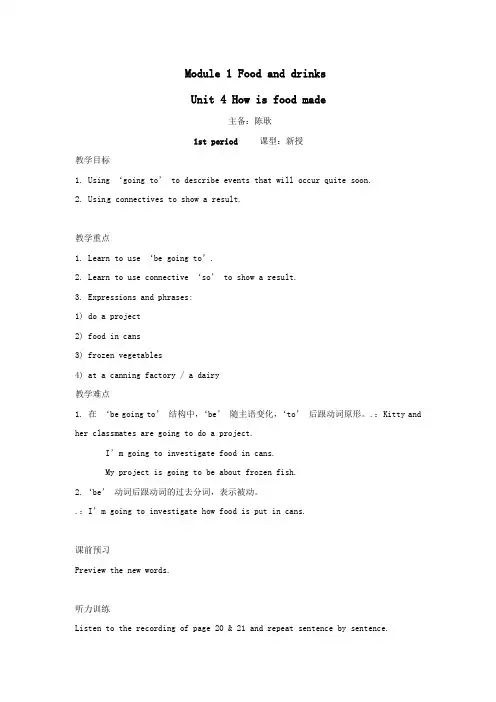
Module 1 Food and drinksUnit 4 How is food made主备:陈耿1st period 课型:新授教学目标1. Using ‘going to’ to describe events that will occur quite soon.2. Usin g connectives to show a result.教学重点1. Learn to use ‘be going to’.2. Learn to use connective ‘so’ to show a result.3. Expressions and phrases:1) do a project2) food in cans3) frozen vegetables4) at a canning factory / a dairy教学难点1. 在‘be going to’结构中,‘be’随主语变化,‘to’后跟动词原形。
.:Kitty and her classmates are going to do a project.I’m going to investigate food in cans.My project is going to be about frozen fish.2.‘be’动词后跟动词的过去分词,表示被动。
.:I’m going to investigate how food is put in cans.课前预习Preview the new words.听力训练Listen to the recording of page 20 & 21 and repeat sentence by sentence.课后巩固I. C hoices:1. ‘What a nice camera!’ ‘Yeah. It ________ Shanghai.’A. made inB. is made inC. is made ofD. made of2. I don’t like eating _______ vegetables.A. freezeB. freezedC. freezingD. frozen3. I’m doing a project, ___ I need to interview someone.A. soB. thatC. becauseD. and4. I’m investigating _____ orange juice is made.A. whatB. howC. thatD. which5. Because it is raining, _____ I won’t go out.A. soB. andC. /D. butII. Words in their proper forms:1. He ____________ to get there on time. (not need)2. He need _______ with them. (come)3. My brother works in a _________ factory. (can)4. My project is going to be about ________ crisps. (make)5. Tina is a _______ working in a _______ . (bake)2nd period & 3rd period教学目标1. Asking ‘Wh-’ & ‘How’ questions to find out specific information.2. Using formulaic expressions to write a formal let ter.教学重点1. Learn to use ‘where’, ‘what’, ‘why’, ‘how’ to ask for specific information.2. Learn to use formulaic expressions to write a formal letter.3. Expressions and phrases:1) so that2) take … out of …3) in refrigerated trucks4) hear from = receive a letter from5) look forward to doing sth.教学难点恰当的理解运用‘where’, ‘what’, ‘why’, ‘how’等疑问词。
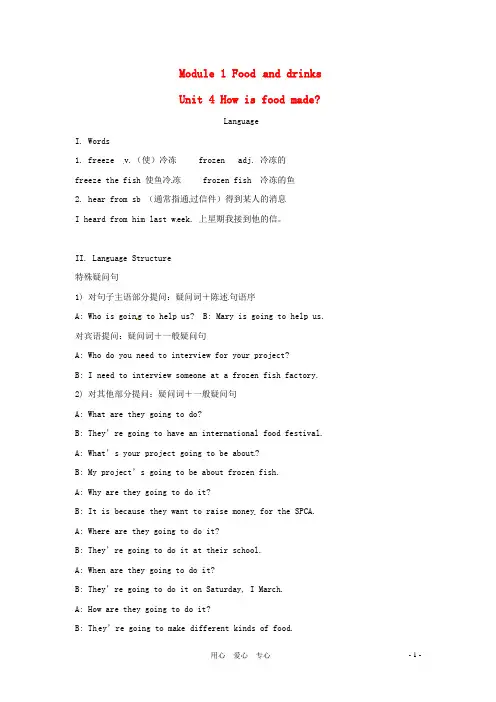
Module 1 Food and drinksUnit 4 How is food made?LanguageI. Words1. freeze v.(使)冷冻 frozen adj. 冷冻的freeze the fish 使鱼冷冻 frozen fish 冷冻的鱼2. hear from sb (通常指通过信件)得到某人的消息I heard from him last w eek. 上星期我接到他的信。
II. Language Structure特殊疑问句1) 对句子主语部分提问:疑问词+陈述句语序A: Who is goin g to help us? B: Mary is going to help us. 对宾语提问:疑问词+一般疑问句A: Who do you need to interview for your project?B: I need to interview someone at a frozen fish factory.2) 对其他部分提问:疑问词+一般疑问句A: What are they going to do?B: They’re going to have an international food festival. A: What’s your project going to be about?B: My project’s going to be about frozen fish.A: Why are they going to do it?B: It is because they want to raise money for the SPCA. A: Where are they going to do it?B: They’re going to do it at their school.A: When are they going to do it?B: They’re going to do it on Saturday, I March.A: How are they going to do it?B: Th ey’re going to make different kinds of food.A: Which food are you going to investigate in your project?B: I think I’m going to investigate frozen fish.III. Notes1. What do you do to the fish before you freeze it?你们在冷冻鱼之前怎么处理它?(before 在……之前。
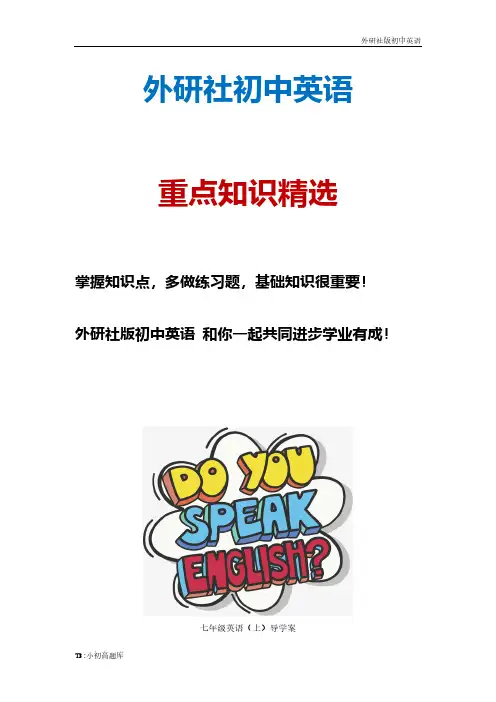
外研社初中英语重点知识精选掌握知识点,多做练习题,基础知识很重要!外研社版初中英语和你一起共同进步学业有成!七年级英语(上)导学案Unit 1 We’ve got lots of apples.(2课时) 主备人完成时间议课时间发放时间上课时间审核人梁结彩第九周第十周第十一周第十一周梁结彩班级姓名小组学习目标1、能够听懂有关食物和饮料的对话。
2、能够用“have/has got…”句型谈论要购买什么食物。
本单元的重点词汇和短语:food, drink, candy, fruit, meat, vegetable, apple, chicken, chocolate, coffee, juice, milk, potato, tea, tomato,water, go shopping, have(has) got, some, lots of, so, bad.学习描述“有……”的句型:We’ve got some…;Have we got any…?;Yes,we have./ No,we haven’t.How about…?学习重点、难点重点:1、能够掌握重点的词汇和句型。
2、能够正确朗读对话。
难点:1、能够掌握“have/has got…”句型的结构。
2、能够运用“have/has got…”句型进行简单交际。
学习一、课前预习1.根据音标拼读Module 4 P20, 21(P92)的单词并完成优化训练P38的自主预习和下面的练习。
根据句意及首字母提示完成单词。
1、My favourite drink is orange j .2、Fruit and v are good for our health.3、He is thirsty(口渴的). He drinks lots of w .内容4、What k of fruit have you got?5、Babies like drinking m .6、It’s bad for little children to eat too much c .7、There are some o______ and apples here for you.二、课堂学习1.教师展示各类食物的相片,学习有关food和drink的单词,完成Activity 1,activity2,和activity3。
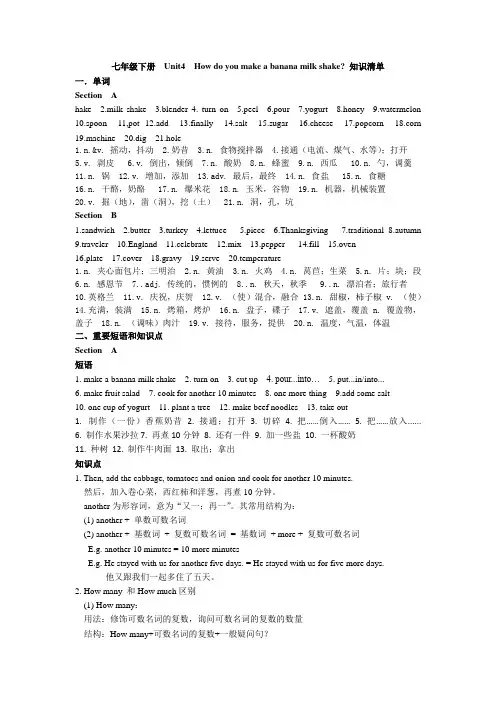
七年级下册Unit4 How do you make a banana milk shake? 知识清单一.单词Section Ahake k shake 3.blender 4. turn on 5.peel 6.pour 7.yogurt 8.honey 9.watermelon 10.spoon 11,pot 12.add 13.finally 14.salt 15.sugar 16.cheese 17.popcorn 18.corn 19.machine 20.dig 21.hole1.n.&v. 摇动,抖动2.奶昔3.n. 食物搅拌器4.接通(电流、煤气、水等);打开5.v. 剥皮6.v. 倒出,倾倒7.n. 酸奶8.n. 蜂蜜9.n. 西瓜 10.n. 勺,调羹11.n. 锅 12.v. 增加,添加 13.adv. 最后,最终 14.n. 食盐 15.n. 食糖16.n. 干酪,奶酪 17.n. 爆米花 18.n. 玉米,谷物 19.n. 机器,机械装置20.v. 掘(地),凿(洞),挖(土) 21.n. 洞,孔,坑Section B1.sandwich2.butter3.turkey4.lettuce5.piece6.Thanksgiving7.traditional8.autumn9.traveler 10.England 11.celebrate 12.mix 13.pepper 14.fill 15.oven16.plate 17.cover 18.gravy 19.serve 20.temperature1.n. 夹心面包片;三明治2.n. 黄油3.n. 火鸡4.n. 莴苣;生菜5.n. 片;块;段6.n. 感恩节7..adj. 传统的,惯例的8..n. 秋天,秋季9..n. 漂泊者;旅行者10.英格兰 11.v. 庆祝,庆贺 12.v. (使)混合,融合 13.n. 甜椒,柿子椒v. (使)14.充满,装满 15.n. 烤箱,烤炉 16.n. 盘子,碟子 17.v. 遮盖,覆盖n. 覆盖物,盖子 18.n. (调味)肉汁 19.v. 接待,服务,提供 20.n. 温度,气温,体温二、重要短语和知识点Section A短语1. make a banana milk shake2. turn on3. cut up4. pour...into…5. put...in/into...6. make fruit salad7. cook for another 10 minutes8. one more thing9.add some salt10. one cup of yogurt 11. plant a tree 12. make beef noodles 13. take out1. 制作(一份)香蕉奶昔2. 接通;打开3. 切碎4. 把……倒入……5. 把……放入......6. 制作水果沙拉7. 再煮10分钟8. 还有一件9. 加一些盐10. 一杯酸奶11. 种树12. 制作牛肉面13. 取出;拿出知识点1. Then, add the cabbage, tomatoes and onion and cook for another 10 minutes.然后,加入卷心菜,西红柿和洋葱,再煮10分钟。
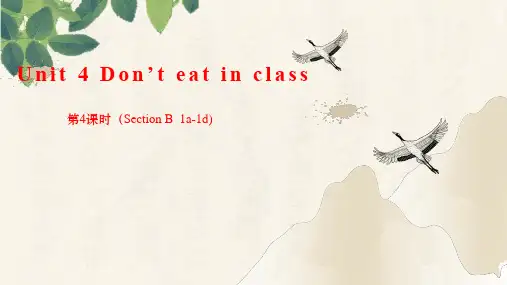
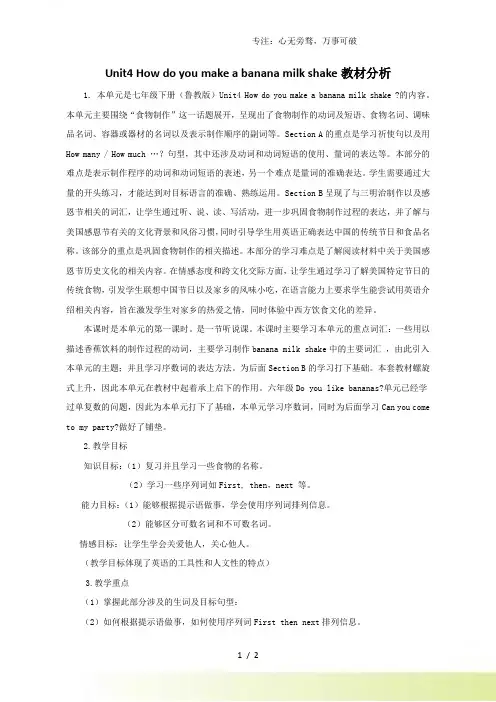
Unit4 How do you make a banana milk shake教材分析1. 本单元是七年级下册(鲁教版)Unit4 How do you make a banana milk shake ?的内容。
本单元主要围绕“食物制作”这一话题展开,呈现出了食物制作的动词及短语、食物名词、调味品名词、容器或器材的名词以及表示制作顺序的副词等。
Section A的重点是学习祈使句以及用How many / How much …?句型,其中还涉及动词和动词短语的使用、量词的表达等。
本部分的难点是表示制作程序的动词和动词短语的表述,另一个难点是量词的准确表达。
学生需要通过大量的开头练习,才能达到对目标语言的准确、熟练运用。
Section B呈现了与三明治制作以及感恩节相关的词汇,让学生通过听、说、读、写活动,进一步巩固食物制作过程的表达,并了解与美国感恩节有关的文化背景和风俗习惯,同时引导学生用英语正确表达中国的传统节日和食品名称。
该部分的重点是巩固食物制作的相关描述。
本部分的学习难点是了解阅读材料中关于美国感恩节历史文化的相关内容。
在情感态度和跨文化交际方面,让学生通过学习了解美国特定节日的传统食物,引发学生联想中国节日以及家乡的风味小吃,在语言能力上要求学生能尝试用英语介绍相关内容,旨在激发学生对家乡的热爱之情,同时体验中西方饮食文化的差异。
本课时是本单元的第一课时。
是一节听说课。
本课时主要学习本单元的重点词汇:一些用以描述香蕉饮料的制作过程的动词,主要学习制作banana milk shake中的主要词汇,由此引入本单元的主题;并且学习序数词的表达方法。
为后面Section B的学习打下基础。
本套教材螺旋式上升,因此本单元在教材中起着承上启下的作用。
六年级Do you like bananas?单元已经学过单复数的问题,因此为本单元打下了基础,本单元学习序数词,同时为后面学习Can you come to my party?做好了铺垫。
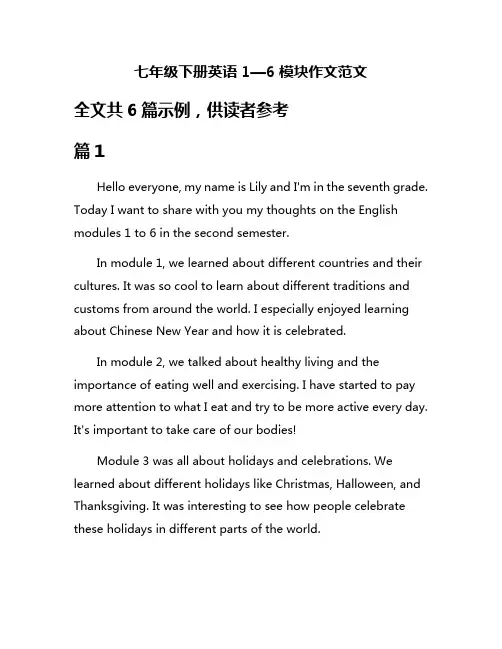
七年级下册英语1—6模块作文范文全文共6篇示例,供读者参考篇1Hello everyone, my name is Lily and I'm in the seventh grade. Today I want to share with you my thoughts on the English modules 1 to 6 in the second semester.In module 1, we learned about different countries and their cultures. It was so cool to learn about different traditions and customs from around the world. I especially enjoyed learning about Chinese New Year and how it is celebrated.In module 2, we talked about healthy living and the importance of eating well and exercising. I have started to pay more attention to what I eat and try to be more active every day. It's important to take care of our bodies!Module 3 was all about holidays and celebrations. We learned about different holidays like Christmas, Halloween, and Thanksgiving. It was interesting to see how people celebrate these holidays in different parts of the world.In module 4, we studied different types of weather and how to describe them. I love talking about the weather, so this module was a lot of fun for me. Now I can describe a sunny day, a rainy day, or a snowy day in English!Module 5 was all about sports and hobbies. We learned vocabulary related to sports and talked about our favorite hobbies. I love playing soccer with my friends, so I was excited to talk about it in class.In module 6, we discussed environmental issues and how we can help protect the planet. We talked about recycling, saving energy, and reducing waste. It made me realize how important it is to take care of the environment for future generations.Overall, I have really enjoyed studying these modules in English class. I have learned so much and can't wait to keep improving my English skills in the future. Thanks for listening to my thoughts, and I hope you have a great day!篇2Title: My Favorite Module in Grade 7Hey everyone, today I want to talk about my favorite module in Grade 7 English class. It's the 1-6 module and I really enjoyed learning new things in it.In this module, we learned a lot of cool stuff like different types of verbs, adjectives, and adverbs. We also practiced reading and writing skills by doing fun activities like grammar exercises and writing essays. It was so much fun to learn new words and use them in our own sentences.One of my favorite parts of the module was when we learned about different cultures and traditions around the world. We read stories about people from different countries and learned about their customs and beliefs. It was so interesting to see how people live in other parts of the world.Another thing I loved about this module was the listening activities. We listened to conversations, stories, and songs in English and tried to understand what they were saying. It helped improve our listening skills and made us more confident in speaking English.Overall, the 1-6 module was so much fun and I really enjoyed learning new things in English class. I can't wait to keep improving my English skills in the next modules. English is such a cool language and I'm excited to learn more about it.篇3Title: My Experience in Grade 7 Module 1-6Hey guys! Today I want to share with you my experience in Grade 7 Module 1-6 in English class. It was super fun and I learned a lot of cool stuff.First, in Module 1, we learned about family and friends. We talked about our families and shared interesting stories about our friends. I found out that we are all different but we can still be great friends.Next, in Module 2, we learned about hobbies and interests. I love drawing and playing soccer, so I was excited to talk about them. I also found out that my classmates have some amazing hobbies too, like playing the piano and dancing.In Module 3, we learned about school life. We talked about our favorite subjects and teachers, as well as our school activities.I shared how much I love English class and how fun it is to participate in school events.Then, in Module 4, we learned about food and drinks. We discussed our favorite foods and drinks, and even shared recipes.I found out that some of my classmates are great cooks and bakers.In Module 5, we learned about health and exercise. We talked about the importance of staying healthy and active. I learned some new exercises to try at home and I feel more energized now.Lastly, in Module 6, we learned about travel and holidays. We shared our dream destinations and talked about the best vacations we've had. I can't wait to go on a trip with my family someday.Overall, Grade 7 English class has been amazing. I've improved my English skills and made new friends. I can't wait to learn more in the next modules. English class rocks!篇4Title: My Experience in the 7th Grade English Module 1 to 6Hey guys! I'm super excited to share with you all about my experience in the 7th Grade English Module 1 to 6. It's been a rollercoaster ride with lots of fun and learning!In Module 1, we learned all about daily routines and hobbies.I had a blast describing my own routines and favorite things todo. It was so cool to talk about what I love and learn about my classmates' hobbies too.Module 2 was all about food and healthy eating. I discovered new words like 'nutritious' and 'balanced diet'. I even tried making a healthy recipe at home with my family. It was yummy!Module 3 was about sports and physical activity. I got to talk about my favorite sports and learn sports-related vocabulary. I even gave a speech in class about why exercise is important. It was nerve-wracking but I did it!In Module 4, we talked about festivals and celebrations. I shared about my favorite holiday and learned about different celebrations around the world. It was cool to see how people from different cultures celebrate.Module 5 was all about animals and the environment. I learned about endangered species and how we can help protect them. I even wrote a letter to a local zoo asking about their conservation efforts.Finally, in Module 6, we talked about technology and social media. I learned about internet safety and how to use social media responsibly. It was eye-opening to see the impact of technology on our lives.Overall, I had an amazing time in the 7th Grade English Module 1 to 6. I made new friends, learned lots of new words, and had fun exploring different topics. I can't wait to see what the next module has in store for us! Thanks for reading, guys!篇5Title: My Seven Grade English Learning JourneyHey guys, have you started learning English in your seven grade? I have and it has been super fun! In this essay, I am going to share with you my learning journey in the first six modules of the seventh grade English textbook.In Module 1, we learned about different countries and their cultures. It was so interesting to learn about the customs and traditions of different countries around the world. I was fascinated by the differences and similarities between China and other countries.In Module 2, we studied about healthy living and the importance of exercise and balanced diet. I realized that eating vegetables and fruits is good for our health and we should avoid junk food. I also learned different ways to keep fit and healthy.Module 3 was all about environmental protection. We learned about the impact of pollution on our planet and how we can help to protect the environment. I was inspired to reduce, reuse, and recycle to make a positive difference in the world.In Module 4, we learned about famous historical figures and their contributions to society. I was amazed by the achievements of people like Abraham Lincoln and Florence Nightingale. They inspired me to work hard and make a difference in the world.Module 5 was about literature and we read some amazing stories and poems. I loved reading about different cultures and traditions through literature. It helped me to improve my language skills and broaden my horizons.In Module 6, we learned about technology and its impact on our daily lives. I realized how important technology is in today's world and how it has changed the way we communicate and work. I also learned about the benefits and drawbacks of using technology.Overall, my seven grade English learning journey has been exciting and enriching. I have improved my language skills, learned about different cultures, and gained valuable knowledge that will help me in the future. I am looking forward to continuing my English learning journey in the next modules ofthe textbook. English is such a fun and important subject, don't you agree?That's all for now, guys. I hope you enjoyed reading about my English learning journey in the seventh grade. Keep learning and exploring the wonderful world of English! Bye for now!篇6Module 1Hello everyone! My name is Lily and I want to share with you about Module 1 in Grade 7 English class. This module is all about our daily routine and how we can talk about it in English. Let me tell you what I have learned.First of all, we learned how to talk about our daily activities using simple present tense. For example, "I wake up at 7 o'clock in the morning" or "I brush my teeth after breakfast." This is important because we need to know how to talk about our daily routine when communicating with others in English.Next, we also learned about adverbs of frequency like always, usually, often, sometimes, and never. These words help us explain how often we do certain activities. For example, "I always do my homework after school" or "I sometimes play basketballwith my friends." It's fun to learn how to use these adverbs in our sentences.In addition, we practiced making questions and answers about daily routine. We asked questions like "What time do you go to bed?" and answered with "I go to bed at 10 o'clock." It's important to know how to ask and answer questions in English conversations.Overall, I really enjoyed Module 1 because it helped me improve my English speaking skills. Now I can confidently talk about my daily routine with others in English. I can't wait to learn more in the next module! Thank you for reading my article. See you next time!。
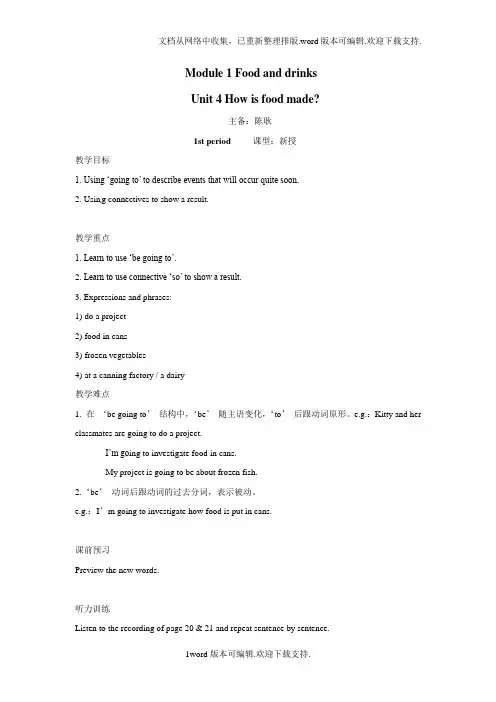
Module 1 Food and drinksUnit 4 How is food made?主备:陈耿1st period 课型:新授教学目标1. Using ‘going to’ to describe events that will occur quite soon.2. Usin g connectives to show a result.教学重点1. Learn to use ‘be going to’.2. Learn to use connective ‘so’ to show a result.3. Expressions and phrases:1) do a project2) food in cans3) frozen vegetables4) at a canning factory / a dairy教学难点1. 在‘be going to’结构中,‘be’随主语变化,‘to’后跟动词原形。
e.g.:Kitty and her classmates are going to do a project.I’m go ing to investigate food in cans.My project is going to be about frozen fish.2.‘be’动词后跟动词的过去分词,表示被动。
e.g.:I’m going to investigate how food is put in cans.课前预习Preview the new words.听力训练Listen to the recording of page 20 & 21 and repeat sentence by sentence.课后巩固I. C hoices:1. ‘What a nice camera!’ ‘Yeah. It ________ Shanghai.’A. made inB. is made inC. is made ofD. made of2. I don’t like eating _______ vegetables.A. freezeB. freezedC. freezingD. frozen3. I’m doing a project, ___ I need to interview someone.A. soB. thatC. becauseD. and4. I’m investigating _____ orange juice is made.A. whatB. howC. thatD. which5. Because it is raining, _____ I won’t go out.A. soB. andC. /D. butII. Words in their proper forms:1. He ____________ to get there on time. (not need)2. He need _______ with them. (come)3. My brother works in a _________ factory. (can)4. My project is going to be about ________ crisps. (make)5. Tina is a _______ working in a _______ . (bake)2nd period & 3rd period教学目标1. Asking ‘Wh-’ & ‘How’ questions to fi nd out specific information.2. Using formulaic expressions to write a formal let ter.教学重点1. Learn to use ‘where’, ‘what’, ‘why’, ‘how’ to ask for specific information.2. Learn to use formulaic expressions to write a formal letter.3. Expressions and phrases:1) so that2) take … out of …3) in refrigerated trucks4) hear from = receive a letter from5) look forward to doing sth.教学难点恰当的理解运用‘where’, ‘what’, ‘why’, ‘how’等疑问词。
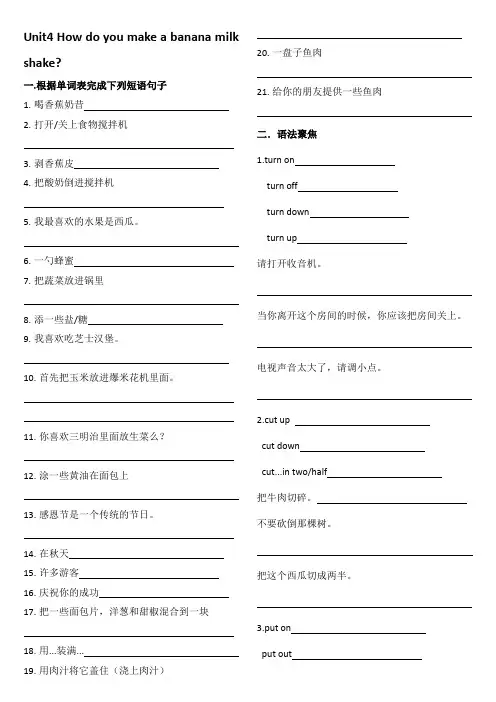
Unit4 How do you make a banana milkshake?一.根据单词表完成下列短语句子1.喝香蕉奶昔2.打开/关上食物搅拌机3.剥香蕉皮4.把酸奶倒进搅拌机5.我最喜欢的水果是西瓜。
6.一勺蜂蜜7.把蔬菜放进锅里8.添一些盐/糖9.我喜欢吃芝士汉堡。
10.首先把玉米放进爆米花机里面。
11.你喜欢三明治里面放生菜么?12.涂一些黄油在面包上13.感恩节是一个传统的节日。
14.在秋天15.许多游客16.庆祝你的成功17.把一些面包片,洋葱和甜椒混合到一块18.用...装满...19.用肉汁将它盖住(浇上肉汁)20.一盘子鱼肉21.给你的朋友提供一些鱼肉二.语法聚焦1.turn onturn offturn downturn up请打开收音机。
当你离开这个房间的时候,你应该把房间关上。
电视声音太大了,请调小点。
2.cut upcut downcut...in two/half把牛肉切碎。
不要砍倒那棵树。
把这个西瓜切成两半。
3.put onput output up put off put away用how many 和 how much 作答1.How ( ) money do you have?2.How ( ) birds are there in the tree?3.How ( ) oranges should we buy?4.How ( ) orange is there in the bottle?5.( )--Mom:How much is this jacket? --Son:Thirty dollars.A.How manyB.How muchC.How farD.How old1.Look! There are a lot of _______(leaf) on the ground.2.There are five _________(people) in the room.3.I have got two __________(glass) of _________ (milk).4.There are 47 __________ (desk) in our classroom.5.A horse has four _________ (foot).6.There are some __________ (dumpling) on the plate.7.He has got two ________(box) of ______. (apple) 8. Those _________ (child) can play football. 9. There are five _________ (pear) jeans in the box. 10. I have got a piece of _________(bread).11. The __________( American) like to eat fried chicken. 三.阅读理解Everyone likes sandwiches (三明治). We eat them everywhere (到处). We can take them with us. They can be 1 or small. But where did they come from? Who 2 the first sandwich?A long time ago 3 a man from England. He 4 to play cards (纸牌). He could play cards 5 He couldn't stop. He didn't even (甚至) stop to eat!One day he asked his cook (厨师) to 6 him some meat between 7 pieces of bread. He took the bread and meat in one hand and played cards with the other 8 . That was when the first sandwitch was made. The name of the 9 was John Montague. He was also known as (因……而闻名)the Earl (伯爵) of 10 .1.[ ]A .long B .big C .clean D .tall 2.[ ]A .had B .made C .saw D .bought 3.[ ]A .there is B .is there C .there was D .was there 4.[ ]A .loved B .didn't love C .had D .didn't have 5.[ ]A .all the same B .all his lifeC .all by himselfD .all day and all night 6.[ ]A .bring B .take C .buy D .show 7.[ ]A .two B .three C .four D .five8.[ ]A .eye B .ear C .hand D .foot9.[ ]A .meat B .bread C .man D .woman10.[ ] A .cards B .england C .sandwich D .bread。
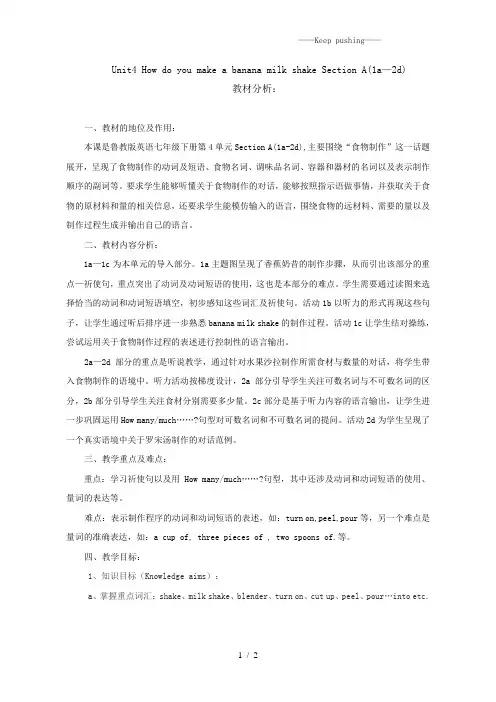
Unit4 How do you make a banana milk shake Section A(1a—2d)教材分析:一、教材的地位及作用:本课是鲁教版英语七年级下册第4单元Section A(1a-2d),主要围绕“食物制作”这一话题展开,呈现了食物制作的动词及短语、食物名词、调味品名词、容器和器材的名词以及表示制作顺序的副词等。
要求学生能够听懂关于食物制作的对话,能够按照指示语做事情,并获取关于食物的原材料和量的相关信息,还要求学生能模仿输入的语言,围绕食物的远材料、需要的量以及制作过程生成并输出自己的语言。
二、教材内容分析:1a—1c为本单元的导入部分。
1a主题图呈现了香蕉奶昔的制作步骤,从而引出该部分的重点—祈使句,重点突出了动词及动词短语的使用,这也是本部分的难点。
学生需要通过读图来选择恰当的动词和动词短语填空,初步感知这些词汇及祈使句。
活动1b以听力的形式再现这些句子,让学生通过听后排序进一步熟悉banana milk shake的制作过程。
活动1c让学生结对操练,尝试运用关于食物制作过程的表述进行控制性的语言输出。
2a—2d部分的重点是听说教学,通过针对水果沙拉制作所需食材与数量的对话,将学生带入食物制作的语境中。
听力活动按梯度设计,2a部分引导学生关注可数名词与不可数名词的区分,2b部分引导学生关注食材分别需要多少量。
2c部分是基于听力内容的语言输出,让学生进一步巩固运用How many/much……?句型对可数名词和不可数名词的提问。
活动2d为学生呈现了一个真实语境中关于罗宋汤制作的对话范例。
三、教学重点及难点:重点:学习祈使句以及用How many/much……?句型,其中还涉及动词和动词短语的使用、量词的表达等。
难点:表示制作程序的动词和动词短语的表述,如:turn on,peel,pour等,另一个难点是量词的准确表达,如:a cup of, three pieces of , two spoons of.等。
Unit 4 Period 5Section B 3a-self check课时目标知识目标:1.熟练掌握以下词汇:serve,temperature,wash,enjoy,2.熟练掌握以下短语:think of,one by one,make a list of,a piece of,3.熟练掌握以下句型:To make this special food,you need to…技能目标:1,会用本节新词和短语,能听说读写;2能读懂描述程序的材料,能就某个操作程序口对对话,初步书面编写这样的对话;情感态度:通过实践活动,培养学生的实际操作能力,调动学生的情感态度、兴趣等非智力因素。
课前预习Ⅰ. 回想你最爱的家乡美食,做一个表格填入3b。
Ⅱ.在同学之中展开调查,询问他们最爱的家乡美食并记录下来。
Warming up全班进行交流,讨论各自最爱的家乡美食。
讨论时可借助如下句型:A:What do you think of your favorite food?B: I think it is….While reading1. Skimming(略读):在3a中作者描述了云南米线的制作过程。
快读短文,完成3a2. Scanning(找读):1)仔细阅读短文,完成3a的填空。
2)再细读短文,在3a中标出过渡性词汇。
3) 大声朗读5分钟。
然后复述背诵。
3. Reading up(研读)1)自主学习——找出重、难点。
______________________2)合作探究——细读全文,提出疑难问题,小组讨论,互助解答。
______________观察与思考:A.这篇短文中描述了云南米线的制作过程,你还知道其他哪些美食的制作过程呢?完成3c(可依据3a, 3b的形式)__________________________________________________________________________________ __________________________________________________________________________________ __________________________________________________________________________________ __________________________________________________________________________________ __________________________________________________________________________________ _____________________________________(2) It’s time to…译为______,后接_______,可与________互换。
七年级英语下册M4U1预习指导一、知识点1.Life (名词) “生活;生命”Eg: Life in the future.未来的生活2.chalk (不可数名词) “粉笔”Eg: a piece of chalk一根粉笔chalk (可数名词) “粉笔”表种类时可数Eg: some coloured chalks一些彩色粉笔3.paper (不可数名词) “纸”Eg: a piece of paper 一张纸paper (可数名词) 论文;文件Eg: Please hand in your papers.请把你的论文交上来。
4.carry sth.to + 地点带某物去某地Eg: Please carry this book to the classroom.请把这本书带到教室。
Carry, bring, take, carry 区别:Carry (动) “带”,指随身携带Bring (动) “带来”,从别处带到说话人处Take (动) “带去”从说话人处带到别处get (动)“去拿”离开去取在回来,强调动作的往返。
5.change (动词) 改变常见搭配:change … into…把..变成…change … for…用…换…changes (n.) 零钱Eg: She changed the kid into a bird.她把这个小孩变成一只鸟。
6.Everything (不定代词) “一切事物”注意:作主语时,谓语动词用单数Eg: Everything is ready.一切准备就绪。
7.Different (形容词) “不同的”-- difference (名词) “不同点”常见搭配:be different from... “与...不同”Eg: This book is different from that one.这本书和那本不同。
8.in the future 特指将来的某一刻Eg: Do you want to go to America in the future? 你将来想去美国吗?in future 指从今以后的全部将来Eg: I hope you’ll be careful in future.我希望你未来小心。
2019-2020年七年级英语下册 Unit 4 Food教案牛津版学习目标:1学习有关食物的词汇.2讨论喜欢与不喜欢的食物.3学会如何表达个人爱好.教学内容:词汇: hamburger, hungry, energy, never, bowl , vegetable, hate, carrot, healthy 词组: have a hamburger ,many times a day , walk to,句型:What food do you like?What ab out …?I like/dislike/love/hate….You never exercise.I need a lot of energy教学准备:录音机,数码投影。
Step 1: Free talk1. How many meals do you have a day?2. What drink do you like best?3. What fruit do you like best?4. What is your favourtie meat?5. What is your favourtie vegetable?Step 2: Presentation①学习新词(学生自己讲出来更好)Hamburger; carrot; vegetable②分类列举食物种类,学生举例教师板书。
(也可以叫学生自由上黑板填写)Step 3: Presentation①T: What food do you like?Do you like …?(if the student says: No, I don’t. then teach “dislike/ hate”)②pair work:A: What do you usually eat for breakfast/ lunch/ supper?B: I usually eat…. for breakfast/ lunch/ supper.A: What food do you like/ love?B: I love / like…A: What food do you dislike/ hate?B: I dislike/ hate…③T: Now here is a table. It’s from the Get Fit Club website. Write the food youlove, like, dislike or hate.④Report time: 学生发言汇报自己或同桌学生的食物喜恶情况。
Unit4·素养综合检测(满分100分,限时60分钟)Ⅰ.语法选择(每小题2分,共20分)(2023广东深圳承翰学校期中)阅读短文,选出填入空白处的最佳选项。
Do you know about the Amazon rainforest?It is home to many different kinds of animals and plants.Chico was born near the Amazon rainforest in Brazil in1944and got1job when he was very young.He made money by2a little rubber(橡胶)from the trees in the forest.The forest and its people lived together comfortably.But some people only thought about3and never thought about the future.In1980,they4the forest to build roads,houses and factories.Chico was angry,and he wanted5the forest.He talked to the government(政府)workers,6they didn't listen to him.Then he held group meetings.He found lots of people agreed with him.His hope grew.7 people came together to stop the work of the forest destroyers(破坏者).They saved large areas of the ter,he traveled to8 countries for help.A lot of people in those countries were very interested in this brave Brazilian.Chico became famous all over the world.The government of Brazil started making plans to protect the Amazon rainforest.Unluckily,Chico died right outside his home9December22,1988.His life was cut short,but people would remember him for protecting rainforests.10would you do to protect the forests in your country after hearing the story?1.A.a B.an C.the2.A.take B.taking C.took3.A.their B.them C.themselves4.A.burn B.burns C.burnt5.A.saves B.to save C.saving6.A.or B.but C.so7.A.Many B.Much C.Few8.A.the others B.another C.other9.A.with B.on C.in10.A.Why B.Where C.WhatⅡ.完形填空(每小题2分,共20分)(2023广东广州市云英实验学校期中)There was a small and very beautiful village.It was near a mountain. There were a lot of11and animals in the mountain.People in the12always got things from the mountain.When they wantedto13a house,they cut down many trees.They also killed the animals and ate their14.Trees were very15in their daily life.They made tables,chairs and beds with the trees.When they16food,they also used wood from the trees.Every year,they cut down lots of trees.And they only cut down trees but17planted new trees.There were fewer and fewer trees in the mountain.Some animals went away and others were in great danger.One day,it rained heavily in the village.The18weather lasted for about a week.The soil(土壤)and the stones on the mountain19 and soon covered the village.The people in the village had no place to live.They finally knew they shouldn't cut down trees.Trees were very important to them.From then on,they plant many trees and20 them.11.A.flowers B.treesC.branchesD.roots12.A.river B.mountainC.villageD.city13.A.build B.findC.paintD.leave14.A.vegetables B.clothesC.fruitD.meat15.A.wonderful B.successfulC.beautifuleful16.A.caught B.boughtC.cookedD.washed17.A.never B.alwaysC.oftenually18.A.bad B.niceC.hotD.cold19.A.cut down B.fell downC.put downD.sat down20.A.fight B.produceC.protectD.digⅢ.阅读理解(每小题3分,共15分)【跨学科·生物】(2023广东实验中学期中)①Can trees talk?Some scientists find that trees can really“talk”!②Some trees use chemicals(化学物质)to talk.When insects attack them,they gives out chemicals from the leaves.This is like a call for help—“I'm being attacked!” Some of these chemicals drive insects away.Others can call birds to come to kill the insects.Scientists hope to learn more about this so that we can use it to keep insects away from crops like rice.③More surprisingly,trees also use sound to talk.People can't hear these sounds,but trees are making them.Some plants make noises with their roots.Some trees make noises when there is not enough water.④Most surprisingly of all,trees have an“Internet” to give out and get information in a big forest.Scientists call it the“Wood Wide Web” (树联网).The fungi(真菌)underground help build up the “Wood Wide Web” among the roots of different trees.It is just like the Internet we ing the“Wood Wide Web”,trees can share information and even food with each other.However,it may also be harmful.Some trees may use it to take too much food from others,or give out chemicals to hurt other plants.Perhaps one day scientists will learn how to build a“Great Wall” to help stop these.⑤Trees talk to each other in different ways.Now,scientists are learning more about these ways and maybe one day we will be able to“talk” with trees ourselves.(E7204003)21.Trees can“talk” in different ways.How many ways does the passage show?A.One.B.Two.C.Three.D.Four.22.【新考法·词义猜测题】What does the word“attack” mean in Paragraph2?A.Hurt.B.Burn.C.Protect.D.Catch.23.Why may trees make noises according to Paragraph3?A.They want to use chemicals.B.They need more water to keep alive.C.They would like to share information.D.They wish people to hear their sound.24.If there is no rain for a long time,what disadvantage(坏处)may the“Wood Wide Web” bring?A.Insects may eat more leaves.B.Fungi may not be able to work.C.Some trees may take in water from others.D.Scientists may build up a wall in the forest.25.【新考法·文章结构题】What is the structure of the passage?Ⅳ.根据句意及汉语或首字母提示写出单词(每小题2分,共10分)26.In a forest,people can have more(氧气)to breathe.27.Let's(讨论)the importance of trees.28.The(气体)from the paper factory smells very bad.29.Some forests are in danger,so people are trying to s them.30.To have a better living environment,we must fight a pollution.Ⅴ.根据汉语意思完成句子,每空一词(每小题2分,共10分)31.他腿不好,因此走得慢。
Module 1 Food and drinks Unit 4 How is food made?1Language focus:Using ‘going to’ to describe events that will occur quite soone.g. Kitty and her classmates are going to do project.Using the simple present tense to express thoughtse.g. I think I’m go ing to investigate bread.Asking ‘Wh-’ questions to find out specific information about a food item.e.g. Which food are you going to investigate in your project?Language skills:ListeningRecognize differences in the use of intonation in questions and statements, and respond appropriately. Identify main, ideas of a new topic.Use visual clues, context and knowledge of the world to work out the meaning of an unknown word and a complete expression.SpeakingOpen an interaction by eliciting a response by asking questions or providing information on a topic. Maintain an interaction by asking and responding to others’ opinions.ReadingUse visual clues, context and knowledge of the world to work out the meaning of an unknown word and a complete expressionRecognize recurrent patterns in language structure, such as word structure, word order, sentence structure, organization of text-types.Materials:Student’s Book 7B page 20Cassette 7B and a cassette playerPr eparation:Cue the cassette.Pre-task preparationLanguage learning activity(This section aims at providing students with opportunities to practise the language/vocabulary needed or become familiar with the background for the task that follows.1. Ask students if they know where the food sold at supermarkets is made. Some students may give the correct answer: ‘factories’. Ask students whether they have ever visited certain food factories and whether they know how food is produced in factories. Conduct a survey to find out the types of food factories students have visited. List the types of food factories students have visited. List the type of food on the board.2. Ask any students who have visited food factories to talk about their visited. If most of the students have never visited a food factory, a class trip to a factory could be arranged to give them background knowledge in food production. Encourage students to talk about what food production they would like to know more about3. Tell student they are going to do a project on investigating how a certain kind of food is made. Explain to students the meaning of the world ‘investigate’. Ask individuals the subject of their investigation, like this: Which food are you going to investigate in your project? to elicit: I am going to investigate (name of food). /My project is going to be about (name of food).4. Play the recording: Read. Students listen and follow in their books.5. Ask students to say what food the children in Read have chosen to study.6. Review the food vocabulary in Look, ask and answer. Ask students to suggest some more food items they would like to investigate.7. Students work in pairs to ask and answer questions about a food project in Look, ask and answer using the target language.2Language focus:Using connectives to show a resulte.g. I’m investigating how food is put cans, so I need to talk to someone at a canning factory.Using ‘going to’ to describe events that will occur quite soon.e.g. My project’s going to be about orange juice.Asking ‘Wh-’ questions to find out specifi c information about a thing and a person.e.g. What’s your project going to be about?/ Who do you need to interview for your project?Language skills:ListeningRecognize differences in the use of intonation in questions and statements, and respond appropriately. Unde rstand the connection between ideas by recognizing linking words and phrases.SpeakingOpen an interaction by eliciting a response by asking questions or providing information on a topic. Maintain an interaction by asking and responding to others’ opinions.ReadingRecognize recurrent patterns in language structure, such as word structure, word order, sentence structure, organization of text-types.Understand the connection between ideas by identifying linking words or phrases. Scan a text to locate specific informationMaterials:Stu dent’s Book 7B page 21Cassette 7B and a cassette playerWorkbook 7B page 13Photocopiable page 15Preparation:Cue the cassette. Make a copy of Photocopiable page 15 for each group.Pre-task preparationLanguage learning activity(This section aims at providing students with opportunities to practise the language/vocabulary needed or become familiar with the background for the task that follows.1. Write on the board a list of food items and a list of food factories in two separate columns. Tell students to match the food items to the factories, e.g. yoghurt to dairy; frozen fish to frozen fish factory; noodles to noodle factory, etc. Ask individuals to suggest some more food items they want to investigate and the kind of factory they will visit. Add their suggestion to the columns.2. Ask individuals questions, like this: What is your project going to be about? To elicit: My project’s going to be about (name of food). Then ask: Who do you need to interview for your project? To elicit: I need to interview someone at a (place).3. Invite students to come forward and talk about the food item they are going to investigate, like this: I’m investigating how yoghurt is made, so I need to interview someone at a dairy. Explain to students that they should use the connective ‘so’ to explain what action they are going to take to do the investigation. Remember there is no need for students to learn the passive voice at this stage.4. Have students read Look and read for some time. Then play the recording. Students listen and follow in their books.5. Invite several students to role-play Miss Guo, Kitty and her classmates to ask and answer questions using the target language in Ask and answer, based on the contents of Look and read.6. Invite a student to come forward and ask his/her classmates questions about the projects they have chosen to investigate.7. Students work in groups. Distribute a copy of Photocopiable page 15 to each group. Student tell one another what food they are going to investigate and who they intend to interview. Students fill in the table and organize the information into a short report.ConsolidationGrammar Practice Book 7B page 15Workbook page 133Language focus:Asking ‘Wh-’ questions to find out specific information about a place.e.g. Where do you get the fish from?Asking ‘Wh-’ questions to find out specific information about something.e.g. What do you do to the fish before you freeze it?Asking ‘Wh-’ questions to find out specific informa tion about a reason.e.g. Why do you freeze the fish?Asking ‘How’ questions to find out specific information about a method.e.g. How do you get the frozen fish to the shops?Language skills:ListeningRecognize differences in the use of intonation in questions and statements, and respond appropriately. Listen for specific informationSpeakingOpen an interaction by eliciting a response by asking questions or providing information on a topicReadingRecognize format and language features in non-narrative texts.WritingDevelop written texts by using appropriate format, conventions and language feature features when writing non-narrative texts.Materials:Student’s Book 7B page 22Cassette 7B and a cassette playerWorkbook 7B page 15Photocopiable pages 16 and 17Preparation:Cue the cassette. Make a copy of Photocopiable page 16 and 17 for each student.Pre-task preparation1. Review with students the use of interrogatives by asking students questions about their food projects, like this: What is your project about? Why did you choose to investigate (name of food/drink)? Where are you going to visit? Who do you need to interview? How are you going to visit the person? Write students’ answers to the questions on the board.2. Tell students to read E ddie’s questions for the frozen fish factory. Play the recording: Look and read. Students listen and follow in their books.3. Students pair up to practise the dialogue between Danny and the man at the frozen fish factory. Invite some pairs to come forward to act out the interview and read the dialogue.4. Ask questions: Where do the people at the frozen fish factory get the fish from? What do they do to the fish before they frozen it? Why do they freeze the fish? Howdo they get the frozen fish to the shops? Students are required to give short answers to show their understanding of the key points.5. Distribute a copy of Photocopiable page 16 each student. Tell students to complete Eddie’s notes about his visit to the frozen fish factory. Students in pairs read each other’s notes and make corrections if necessary.ConsolidationWorkbook page 15Grammar Practice Book 7B page 164Language focus:Using formulaic expressions to begin a formal letter.e.g. Dear Sir/Madam.Using formulaic expressions to end a formal lettere.g. I look forward to hearing from you./ Yours sincerely.Using modals to indicate preferencese.g. I would like to visit your dairy.Asking ‘Wh-’ questions to find out specific information about a day.e.g. Which day will be convenient for me to visit the dairy?Language skills:ReadingScan a text a locate specific informationRecognize the presentation of ideas through heading, Paragraphing, spacing, italic, bold print and punctuationUnderstand intention, attitude and feeling stated in a text by recognizing features such as the choice and use of language.Materials:Student’s Book 7B page 23Cassette 7B and a cassette playerPreparation:Cue the cassette.Pre-task preparationLanguage learning activity(This section aims at providing students with opportunities to practise the language/vocabulary needed or become familiar with the background for the task that follows.1. Review the format of a letter with students, telling them that there are formal and informal letters. Draw students’ attention to the salutation and the complimentary closing which usually indicate whether a letter is in a formal orinformal style, as in Dear Sir/Madam and Dear Danny: Yours sincerely and Love. Bring in the two types of letters and show them to students.2. Have students read Danny’s letter to the dairy. Ask students whether it is a formal or informal letter and the reason for Danny to have written a formal letter. Explain to students under what circumstances and conditions a formal letter is more appropriate. Play the recording: Read. Students listen and follow in their books.ConsolidationGrammar Practice Book 7B page 175Language focus:Using formulaic expression to begin a formal lettere.g. Dear Sir/MadamUsing formulaic expressions to end a formal letter.e.g I look forward to heading from you,/Yours sincerely.Using modals to indicate preferencese.g. I would like to visit your _________.Asking ‘Wh-’ questions to find out specific information about a day.e.g. Which day will be convenient for me to visit ______ ?Language skills:WritingGather and share information, ideas and language by brainstorming, listing and observing.Plan and organize information and ideas by indentifying purpose and audience for a writing task.Develop written texts by expressing ideas and feelings and by writing paragraphs which present ideas logically. Revise and edit short texts by making changes to incorrect spelling, punctuation and grammar, and adding details if necessary in resp onse to suggestions from the teacher.Materials:Student’s Book 7B page 24Cassette 7B and a cassette playerWorkbook 7B page 14ConsolidationGrammar Practice Book 7B page 146Language focus:Using the simple present tense to express needse.g. You also need a saucepan and a flask.Using imperatives to give instructionse.g. Mix, Take, Add, Pour, OpenAsking ‘WH-’ question to find out specific information about somethinge.g. What do you need to make you yoghurt?Using adverbs to express time sequencee.g. First, …/ Secondly, …/ Next, …/ Then /After that, … / Finally, …Language skills:ListeningRecognize differences in the use of intonation in questions and statements, and respond appropriately.Identify main ideas of a new topicListen for specific informationReadingUse visual clues, context and knowledge of the world to work out the meaning of an unknown word and a complete expressionRecognize format and language features in narrative and non-narrative texts. Predict the likely development of a topic by recognizing key words and making use of contexts and knowledge of the world.Scan a text to locate specific inform ationMaterials:Student’s Book 7B page 25Cassette 7B and a cassette playerWorkbook 7B page 16Photocopiable page 18 and 82Preparation:Cue the cassette. Make a copy of Photocopiable page 18 and 82 for each student.Pre-task preparation1. Introduce to students the ingredients and cooking utensils needed to make yoghurt in Look and read. Ask students: What do you need to make yoghurt? To elicit: You need …2. Give students some time to look at the photos and read the captions to understand the procedures for making yoghurt. Ask individual students: What do you do first? To elicit: First, you mix the milk and the powdered milk in the saucepan. Heat …, What do you do secondly/next/then/after that/ finally? To elicit corresponding answers to the questions3. Play the recording: Look and re ad. Students listen and follow in their books. Pause the tape at the beginning of each procedure, ask students to read out an appropriate adverb of time, and continue playing the tape.ConsolidationGrammar Practice Book 7B page 18 and 21. Photocopiable page 19 and 24。